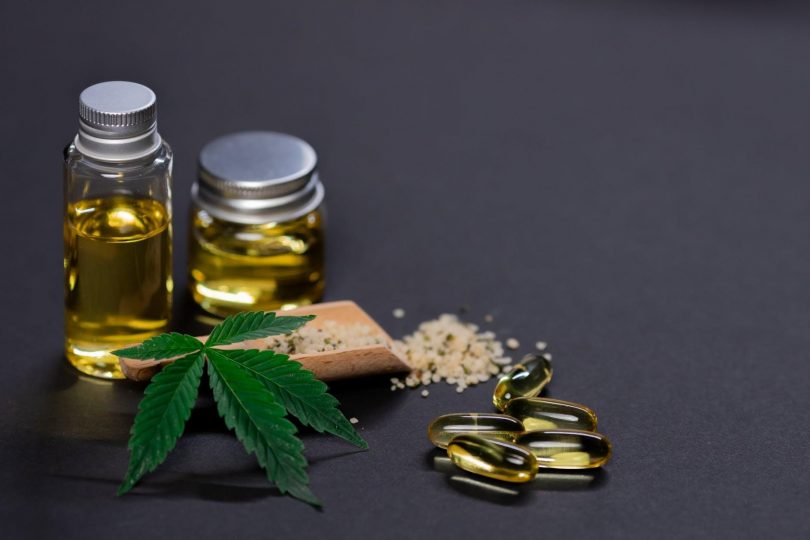Psychotherapy is an alternative treatment for medicine that is used to try to relieve the symptoms associated with mental illness. Effective awareness studies show that herbal remedies and alternative medicine have existed for years. For instance, China, India, and several indigenous tribes have practiced psychotherapy since the 19th century worldwide.
Thanks to effective awareness strategies and studies, the cannabinoid CBD (cannabidiol) that’s found in cannabis plants is gaining interest for its uses in treating mental illnesses. [1] CBD derived from cannabis does not cause a feeling of being high when used alone for psychotherapy.
Ingredients Found in CBD Oil
CBD oil is a non-intoxicating, herbal remedy made from extracted hemp biomass, and is known for its potent anti-inflammatory qualities. [2] Because CBD oils contain little-to-no delta-9-tetrahydrocannabinol (THC), people can reap the benefits of the therapeutic effects of CBD oil, without feeling high. There are many other phytochemicals within the cannabis plant beyond THC and CBD, including minor cannabinoids like cannabichromene (CBC) and cannabigerol (CBG), as well as terpenes and flavonoids. [3]
Is Cannabis Effective in Treating Mental Disorders?
The effects of CBD oils have proven to be beneficial in treating many mental illnesses. [1,4] Its approval among people of all ages is increasing as these products have become popular.
According to evidence from 23 lab studies [4] and an open attitude of effective awareness studies, researchers found CBD oil extracted from cannabis helped treat several psychotic symptoms in patients with a variety of mental illnesses, including:
- Schizophrenia
- Anxiety
- Autism
- ADHD (attention deficit disorder)
- Bipolar disorder
- PTSD (posttraumatic stress disorder)
- Insomnia
- Tourette Syndrome
Although evidence for the use of CBD as a treatment for psychiatric disorders still needs to be studied in more depth, a 2020 review article considered how CBD can benefit mental health and psychotherapy, pointing to the molecule’s potential for treating sleep disorders and PTSD. [5]
Some of the therapeutic benefits of CBD oil may include:
- Anti-inflammatory properties [6]
- Neuroprotective agents
- Antipsychotics [7]
- Anti-arthritic benefits
- Preventing chronic pain [8]
- Arthritis or joint pain
- Effective treatment for anxiety and depression [9]
- Treating sleep disorders
- Helping to relieve migraines
- Headache relief
- Working to relieve nausea
- Assisting with the treatment of cancer patients [10]
- Relieving allergies or asthma
- Helping to reduce the symptoms of neurological disorders like epilepsy and other seizure disorders [11]
- Aiding in symptoms associated with multiple sclerosis (MS) [12]
- Healing lung conditions
- Reducing the symptoms associated with Parkinson’s disease (calms shaking)
- Lessening the effects of Alzheimer’s disease
Is CBD Oil Safe to Take?
Although studies have shown that taking CBD oil is usually safe for human consumption [2], some side effects may be present, including irritability, feelings of nausea or upset stomach, and fatigue. Taking CBD oil can also raise the amount of blood thinning that occurs in your body and other medicines in your system.
People who use high doses of CBD oil may also show various abnormalities in specific blood tests. Some non-prescription drugs, such as Tylenol, or Advil, also have this effect on blood tests, therefore, it’s important to let your doctor know beforehand if you are taking CBD oil.
A considerable safety concern with taking CBD oils is that they are a supplement and not a medication. Therefore, regulations are not required to record the number of active ingredients. You cannot be sure exactly how many elements are in each dose or if you are taking the proper amount for your particular illness.
Results of Studies on the Effects of CBD Oil for Psychotherapy
Various studies show evidence that CBD helps reduce side effects associated with multiple mental illnesses. [1] Studies also suggest that CBD oil is also beneficial for improving sleep patterns. However, it still needs to be examined further to determine its effect on sleep patterns in PTSD disorders.
One study showed potential benefits for people taking CBD oil with ADHD. [13] However, studies warn CBD oil is not beneficial for children, youths, pregnant, or breast-feeding women until further studies are done. People with respiratory and cardiovascular conditions should also be cautious when considering the use of CBD oils.
Conclusion
Studies have determined that, although CBD oil is quite popular for many people suffering from mental illnesses, research to determine the full effects of CBD oil as an effective remedy for psychotherapy still requires more testing. Long-term effects need to be studied in further detail to better address CBD’s efficacy.
If you are interested in learning more about the healing benefits of CBD oil in the treatment of psychotherapy, consult with your doctor and ask if CBD oils are the right choice for you.
Author Bio:
Fay Smith has a bachelor’s degree in English Literature. She decided to settle down and write freelance for wellness products. Her interest in radiology started when she first became pregnant. Now she regularly contributes to W-Radiology.com. As a mother and an advocate of all things natural, she tried CBD when friends recommended it for common aches and pain.
References
[1] Oberbarnscheidt T, Miller NS. The impact of cannabidiol on psychiatric and medical conditions. J Clin Med Res. 2020;12(7):393-403. [journal impact factor = 5.583; times cited = 9][2] Larsen C, Shahinas J. Dosage, efficacy and safety of cannabidiol administration in adults: A systematic review of human trials. J Clin Med Res. 2020;12(3):129-141. [journal impact factor = 5.583; times cited = 38]
[3] Andre CM, Hausman JF, Guerriero G. Cannabis sativa: The plant of the thousand and one molecules. Front Plant Sci. 2016;7:19. [journal impact factor = 5.753; times cited = 601]
[4] Khan R, Naveed S, Mian N, Fida A, Raafey MA, Aedma KK. The therapeutic role of Cannabidiol in mental health: a systematic review. J Cannabis Res. 2020;2(1):2. [journal impact factor = N/A; times cited = 21]
[5] Sarris J, Sinclair J, Karamacoska D, Davidson M, Firth J. Medicinal cannabis for psychiatric disorders: a clinically-focused systematic review. BMC Psychiatry. 2020;20(1):24. [journal impact factor = 3.388; times cited = 60]
[6] Atalay S, Jarocka-Karpowicz I, Skrzydlewska E. Antioxidative and anti-inflammatory properties of cannabidiol. Antioxidants (Basel). 2019;9(1):21. [journal impact factor = 5.952; times cited = 127]
[7] Iseger TA, Bossong MG. A systematic review of the antipsychotic properties of cannabidiol in humans. Schizophr Res. 2015;162(1-3):153-161. [journal impact factor = 4.939; times cited = 179]
[8] Darkovska-Serafimovska M, Serafimovska T, Arsova-Sarafinovska Z, Stefanoski S, Keskovski Z, Balkanov T. Pharmacotherapeutic considerations for use of cannabinoids to relieve pain in patients with malignant diseases. J Pain Res. 2018;11:837-842. [journal impact factor = 3.133; times cited = 21]
[9] García-Gutiérrez MS, Navarrete F, Gasparyan A, Austrich-Olivares A, Sala F, Manzanares J. Cannabidiol: A potential new alternative for the treatment of anxiety, depression, and psychotic disorders. Biomolecules. 2020;10(11):1575. [journal impact factor = 4.879; times cited = 26]
[10] Marcu JP, Christian RT, Lau D, et al. Cannabidiol enhances the inhibitory effects of delta9-tetrahydrocannabinol on human glioblastoma cell proliferation and survival. Mol Cancer Ther. 2010;9(1):180-189. [journal impact factor = 6.261; times cited = 115]
[11] Devinsky O, Cross JH, Laux L, et al. Trial of cannabidiol for drug-resistant seizures in the Dravet Syndrome. N Engl J Med. 2017;376(21):2011-2020. [journal impact factor = 91.245; times cited = 575]
[12] Rudroff T, Sosnoff J. Cannabidiol to improve mobility in people with multiple sclerosis. Front Neurol. 2018;9:183. [journal impact factor = 4.003; times cited = 10]
[13] Morse MC, Benson K, Flory K. Disruptive behavior disorders and marijuana use: The role of depressive symptoms. Subst Abuse. 2016;9(Suppl 1):69-76. [journal impact factor = 3.716; times cited = 5]
Source: https://www.pexels.com/photo/photo-of-marijuana-edibles-on-dark-background-7667731/








